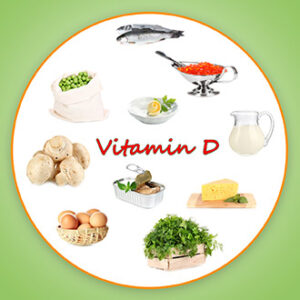Table of Contents
Get Your Daily Dose:

5 Foods Packed with Vitamin D
As a health-conscious individual, I understand the importance of eating a balanced diet to maintain good health. One of the essential nutrients that our bodies need is Vitamin D. It helps our bodies absorb calcium and phosphorus, which are crucial for healthy bones and teeth. However, many people are deficient in Vitamin D, which can lead to a host of health problems. In this blog post, I will discuss the importance of Vitamin D, its sources, and how to incorporate it into your diet.
Why is Vitamin D important?
Vitamin D plays a crucial role in maintaining good health. It is necessary for the proper functioning of our immune system, and it helps regulate the absorption of calcium and phosphorus in our bodies. Vitamin D deficiency can lead to weakened bones, which can result in fractures and osteoporosis. It has also been linked to an increased risk of certain types of cancer, such as breast, colon, and prostate cancer.
Vitamin D deficiency symptoms
Vitamin D deficiency is prevalent, especially in areas with less exposure to the sun. Some common symptoms of Vitamin D deficiency include fatigue, muscle weakness, bone pain, and depression. In severe cases, it can lead to rickets in children and osteomalacia in adults.
Natural sources of Vitamin D
The most significant source of Vitamin D is sunlight. When our skin is exposed to sunlight, it produces Vitamin D. However, many people don’t get enough sun exposure, especially during the winter months. Fortunately, there are other natural sources of Vitamin D that we can incorporate into our diet.
5 foods that are high in Vitamin D
1. Fatty Fish – Fatty fish such as salmon, trout, and mackerel are excellent sources of Vitamin D. A 3.5-ounce serving of cooked salmon contains around 360 IU of Vitamin D, which is more than the recommended daily intake for most people.
2. Egg yolks – Egg yolks are another good source of Vitamin D. One large egg yolk contains around 40 IU of Vitamin D.
3. Mushrooms – Some mushrooms, such as shiitake and portobello, contain Vitamin D. However, the amount varies depending on the type of mushroom and how it was grown.
4. Fortified foods – Many foods such as milk, orange juice, and cereal are fortified with Vitamin D. Check the label to see how much Vitamin D is in each serving.
5. Cod liver oil – Cod liver oil is a supplement that is high in Vitamin D. One tablespoon contains around 1,300 IU of Vitamin D.
Recipes that incorporate Vitamin D-rich foods
Here are some recipes that incorporate Vitamin D-rich foods:
1. Salmon and vegetable stir-fry – Heat some oil in a wok and stir-fry some sliced vegetables such as broccoli, bell peppers, and carrots . Add some cooked salmon and season with soy sauce and sesame oil.
2. Mushroom omelet – Whisk two eggs with some milk and season with salt and pepper. Saute some sliced mushrooms in a pan and add the egg mixture. Cook until the eggs are set and serve with toast.
3. Fortified cereal with milk – Choose a cereal that is fortified with Vitamin D and serve with milk. Add some fresh fruit for extra nutrients.
How to incorporate Vitamin D supplements into your diet
If you are unable to get enough Vitamin D from food sources or sunlight, you may need to take a supplement. It is important to speak with your doctor before taking any supplements, as too much Vitamin D can be harmful. They can advise you on the appropriate dosage and type of supplement to take.
The role of sunlight in Vitamin D absorption
Sunlight is the most significant source of Vitamin D. When the skin is exposed to sunlight, it produces Vitamin D3, which is then converted into its active form in the liver and kidneys. However, it is essential to be mindful of sun exposure and to protect your skin from the harmful effects of UV rays.
Vitamin D and its impact on bone health
Vitamin D plays a vital role in maintaining healthy bones. It helps our bodies absorb calcium and phosphorus, which are crucial for bone growth and maintenance. Vitamin D deficiency can lead to weakened bones, which can result in fractures and osteoporosis.
Vitamin D and immune system support
Vitamin D also plays a role in supporting our immune system. It helps our bodies fight off infections and can reduce the risk of certain autoimmune diseases. Some studies have also shown that Vitamin D may help reduce the risk of respiratory infections.
Conclusion
In conclusion, Vitamin D is a vital nutrient that our bodies need to maintain good health. It is essential for bone health, immune system support, and overall well-being. Incorporating Vitamin D-rich foods into your diet can help ensure that you are getting enough of this essential nutrient. If you are unable to get enough Vitamin D from food sources or sunlight, speak with your doctor about taking a supplement. Remember to be mindful of sun exposure and protect your skin from the harmful effects of UV rays.
So, start incorporating these Vitamin D-rich foods into your diet today to get your daily dose of this essential nutrient. Stay healthy, stay happy!
SEE ALSO:
12 Lesser-Known Health Advantages of Bay Leaves
Seven Tips to Maintain Healthy Skin
Healing Pink Skin After a Burn: A 9-Step Guide for Recovery
Top 12 Most Consumed Products in Nigeria in 2023
Leave a Reply